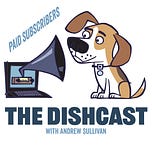Chris is a TV broadcaster and author. During his political career, he was a speechwriter for Jimmy Carter and the chief of staff for House Speaker Tip O’Neill. In journalism, Chris was a columnist with the San Francisco Examiner and then the Chronicle, the host of “Hardball with Chris Matthews,” and the host of “The Chris Matthews Show,” where I was a frequent guest. He’s also written nine books. He’s currently a professor at Fulbright University Vietnam, and he recently revived “Hardball” on Substack — check it out.
Chris was his usual gregarious, loquacious, opinionated self. We had a blast. For two clips of our convo — memorable quips from world leaders, and debating the legacy of JFK — head to our YouTube page.
Other topics: growing up a Catholic in Philly with four brothers; showing up late to Mass; the Good Friday Agreement; absorbing Burke as a teen and lauding Bill Buckley; doing Peace Corps in Africa; working for Sen. Frank Moss; a stint as a Capitol cop; running for Congress in Philly; working for Ed Muskie the liberal budget hawk; Rick Hertzberg; writing for Carter and smoking cigs on Air Force One; the Iranian hostage crisis; Tip O’Neill the liberal titan; the corrupt Mayor Curley; Reagan the cowboy and ideas man; his tax cuts; Peggy Noonan’s epic speeches; Reagan’s humor; taking the piss out of Corbyn; the seductive charm and shittiness of Bill Clinton; his undeserved impeachment; Gore’s disastrous run; the collective trauma of 9/11; neocons and the Iraq War; Obama’s political genius; the nuclear threat from Iran; debating the woke’s role in electing Trump; Biden’s leftward lurch and Ron Klain; Tim Walz; GOP lawmakers’ fear of Trump; his slavish sycophants; the patriotism that liberal elites don’t fully grok; and the beauty of naturalization ceremonies.
Browse the Dishcast archive for an episode you might enjoy (the first 102 are free in their entirety — subscribe to get everything else). Coming up: Batya Ungar-Sargon on Trump 2.0, Walter Isaacson on Ben Franklin, Tara Zahra on the revolt against globalization after WWI, Paul Elie on crypto-religion in ‘80s pop culture, Thomas Mallon on the AIDS crisis, Arthur Brooks on the science of happiness, and Johann Hari coming back to turn the tables and interview me for the pod. Please send any guest recs, dissents, and other comments to dish@andrewsullivan.com.
From a fan of last week’s pod on President McKinley:
Long-time subscriber here, but I’ve never sent a comment till now. Great discussion with Robert Merry on the war hero and president.
Another writes:
I enjoyed the episode on McKinley very much. It’s a fascinating period of history. But I would have liked a bit more on the 1896 race, which was hugely consequential — not least because it birthed the modern Democratic Party. I think there were two main reasons why McKinley beat William Jennings Bryan.
First, it was a bad year to run as a Democrat. The economy had been in severe recession following the collapse of Barings Bank in 1890, and this hurt Grover Cleveland. Second, Bryan’s main concern was the plight of farmers, which turned off industrial workers (who wanted cheap food). And his staunch evangelical Protestantism didn’t help with Catholic immigrants.
In a sense, McKinley got lucky. The US had gone through severe deflation between 1873 and 1896 (this was called the “great depression” at the time). Bryan was right to blame the gold standard for this, but there were major gold discoveries in South Africa after 1896 and this was sufficient to end the deflation and restore prosperity. McKinley, of course, had nothing to do with this, but he benefited.
By the way, I wrote a Washington Post op-ed on what Democrats can learn from this historical tariff debate (Bryan opposed the tariff).
On another recent episode:
Good gravy! I saw that the conversation with Sam Tanenhaus on Bill Buckley is 2h41m. This one better be good! I didn’t watch The Brutalist when I saw the runtime, but I trust you.
Other listeners really loved it, including this one:
I loved the conversation with Sam Tanenhaus. You called it “Rogan-esque” for its unusual length, but it was also brisk, energetic and focused. It’s one of my favorites.
And it got me wondering whether you have views on Joe Rogan that you’d like to share. (You’ve mentioned him many times.) What are your thoughts on his podcasting skills? Why do you think he’s been so successful?
I think he’s successful because he doesn’t have pretensions to expertise, asks the kind of questions normies would, is not really political but just human, and has tackled subjects — race and IQ, trans ideology, vaccines, aliens, etc — that most professional journals refuse to. And he has a near-perfect voice for radio, a lovely balm of tone.
From a listener who “finally finished the conversation on Buckley”:
I just have to say how much I LOVED it! Freaking loved it! So lively and funny and super interesting. So many characters — only half of whom I have heard of, but that took nothing away from my enjoyment. Sam certainly comes across as a really lovely guy. So thanks for that one!
Yet another on the Buckley pod:
Quoting from your Dishcast: “But there is a clear line between demanding a university abide by the law and pay its taxes and dictating what it can teach, how it conducts its own affairs, and whom it can hire.” I dunno, Andrew. If Harvard were simply educating or expressing opinions in the public sphere, I would agree with you. But what Harvard is doing is indoctrinating immature minds that their nation and culture are evil and should be eliminated.
I would think long and hard before I threw away Western civilization. Those who treat it lightly have a limited and skewed view of both history and current events. Jaques Barzun predicted in From Dawn to Decadence that Western civilization was going away, to be replaced by something he could not predict. Beware.
Getting back to Harvard, I would have cut off government funding when Harvard removed ROTC from their campus. Why? Let us consider the My Lai massacre in Vietnam. Lieutenant Calley was in charge of the principal offending platoon. Reports at the time described him not as an evil person, but a person who was in way over his head in a very nasty situation. Now, I have never been a big admirer of either Bill Clinton or George Bush II, both of whom schlepped out of that war — one hiding in academia, the other in the Texas National Guard. However, I believed that if either of them had been in command of that platoon, the massacre would not have happened.
The only honorable reason Harvard could have for banning ROTC would be if they determined that their students would perform worse than Lieutenant Calley. Shame on Harvard. Shame on us for ignoring their shameful act. We will get what we deserve.
But Harvard fully reinstated ROTC in 2016! And, as you know, I’m horrified by what Harvard did to the humanities, and its open racism and anti-Semitism. I just don’t want to see a reformable and venerable institution lose its independence.
Here’s a guest rec for the Dishcast:
Your discussion with Tanenhaus on how to understand Trump relative to the history of the modern American right was fascinating.
I agree with you that there are important continuities there — the “own the libs” impulse and the nihilistic criticism-without-responsibility-for-governance impulse being the most obvious. At the same time, there are important discontinuities. In Buckley’s day, the right contained some serious thinkers with a real interest in policy whom Reagan elevated to positions of responsibility. MAGA contains virtually no space for serious thinking; it is performative through and through. To get ahead, one must be willing at all times to subordinate one’s principles to Trump’s grievance du jour.
I know other readers have made this suggestion, and maybe you’ve tried, but I’d love to hear you and Jonah Goldberg in conversation on the history of the right — in particular Trump’s relationship thereto. I understand that you and Goldberg have tangled in the past, and I don’t think he’s fully come to grips with how his own and others’ support for the Iraq War helped to pave the way for Trump, but on the whole, I think he’s conducted himself honorably since 2016, and he’s earned my respect. As you said or wrote recently, The Dispatch is great, and as you’ve also observed, Goldberg has really tried to stick to his conservative guns — neither cheering for Trump nor abandoning all his former right-of-center convictions.
Goldberg had Robert Kagan on his own podcast some months ago to discuss Kagan’s book arguing that Trump represents continuity, not change, with the history of the right:
Goldberg (politely) disagreed with Kagan, but I’d like to hear more from Goldberg on the subject, because I don’t think Kagan made the case for continuity as well as you made it in your conversation with Tanenhaus. I’m suggesting Goldberg for your podcast not because I want or expect bitter argument, but because I’d enjoy hearing two people I respect reflect on history that they’ve both observed and helped to make.
I think Jonah has been superb in the last decade, a real test he passed with flying colors. He’s also an excellent web writer, one of the earliest and best. He essentially created The Corner, which for a while was among the most entertaining of the early blogosphere’s many triumphs.
Next up — sigh — more readers dissent over my column on Israel’s war in Gaza. The first writes:
Everything you wrote could just as easily have been written about the Allies at the end of WW2. I mean, surely you can see the parallels between the following sentences you wrote and the end of that war:
The ability of Hamas, or any of its guerrilla allies, to threaten Israel’s security right now is close to non-existent. And in a battle already largely won, against an enemy on its last legs, the moral justification for continuing relentless infanticide on this scale becomes harder and harder to discern.
By the end of WW2, Germany and Japan surely posed no threat to the United States. And then you snark at the idea that Israel could change the hearts and minds of Palestinians by occupying them:
Listen to this episode with a 7-day free trial
Subscribe to The Weekly Dish to listen to this post and get 7 days of free access to the full post archives.












